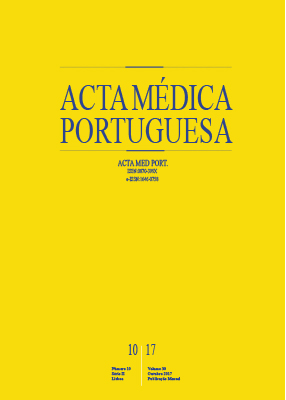Desenvolvimento de um Programa de Treino em Cuidados de Saúde Materna e Assistência ao Recém Nascido para Profissionais de Saúde na Guiné-Bissau
DOI:
https://doi.org/10.20344/amp.8453Palavras-chave:
Desenvolvimento de Pessoal, Educação Contínua, Guiné-Bissau, Promoção da Saúde, Qualidade da Assistência à Saúde, Saúde Infantil, Saúde MaternaResumo
Introdução: O Programa Integrado de Saúde Materna e Infantil visa reduzir a mortalidade materno-infantil na Guiné-Bissau. O objetivo deste artigo é partilhar a experiência no desenvolvimento do treino em cuidados maternos e ao recém-nascido, em quatro regiões da Guiné-Bissau.
Material e Métodos: Os diretores regionais indicaram 12 a 15 profissionais que prestavam assistência pré-natal e ao parto para participarem no treino. Durante oito semanas, 15 sessões predominantemente interativas e práticas foram ministradas em cada região. Foram efetuadas avaliações sumativa e reativa através de um teste final com perguntas de escolha múltipla e de um questionário de
satisfação anónimo, respetivamente.
Resultados: Participaram no treino 25 enfermeiras, 17 parteiras e 14 médicos. Praticamente dois terços tinham cinco ou menos anos de prática clínica. Os resultados do teste final foram superiores nos formandos com dois a nove anos de experiência (medianas de 54,4% a 60,9%), comparativamente àqueles até um ano (47,8%) ou com 10 ou mais anos (45,7%). As variáveis pedagógicas foram classificadas como ‘bom’ ou ‘muito bom’ por 91% a 95% dos participantes.
Discussão: A metodologia interativa e prática produziu bons resultados e foi muito útil para moldar o treino às necessidades locais. Contudo, o programa de estudos deve ser adaptado de acordo com categorias e experiências profissionais.
Conclusão: Os resultados obtidos justificam o desenvolvimento e a avaliação adicional de programas de formação em cuidados de saúde materna e neonatal na Guiné-Bissau.
Downloads
Downloads
Publicado
Como Citar
Edição
Secção
Licença
Todos os artigos publicados na AMP são de acesso aberto e cumprem os requisitos das agências de financiamento ou instituições académicas. Relativamente à utilização por terceiros a AMP rege-se pelos termos da licença Creative Commons ‘Atribuição – Uso Não-Comercial – (CC-BY-NC)’.
É da responsabilidade do autor obter permissão para reproduzir figuras, tabelas, etc., de outras publicações. Após a aceitação de um artigo, os autores serão convidados a preencher uma “Declaração de Responsabilidade Autoral e Partilha de Direitos de Autor “(http://www.actamedicaportuguesa.com/info/AMP-NormasPublicacao.pdf) e a “Declaração de Potenciais Conflitos de Interesse” (http://www.icmje.org/conflicts-of-interest) do ICMJE. Será enviado um e-mail ao autor correspondente, confirmando a receção do manuscrito.
Após a publicação, os autores ficam autorizados a disponibilizar os seus artigos em repositórios das suas instituições de origem, desde que mencionem sempre onde foram publicados e de acordo com a licença Creative Commons









